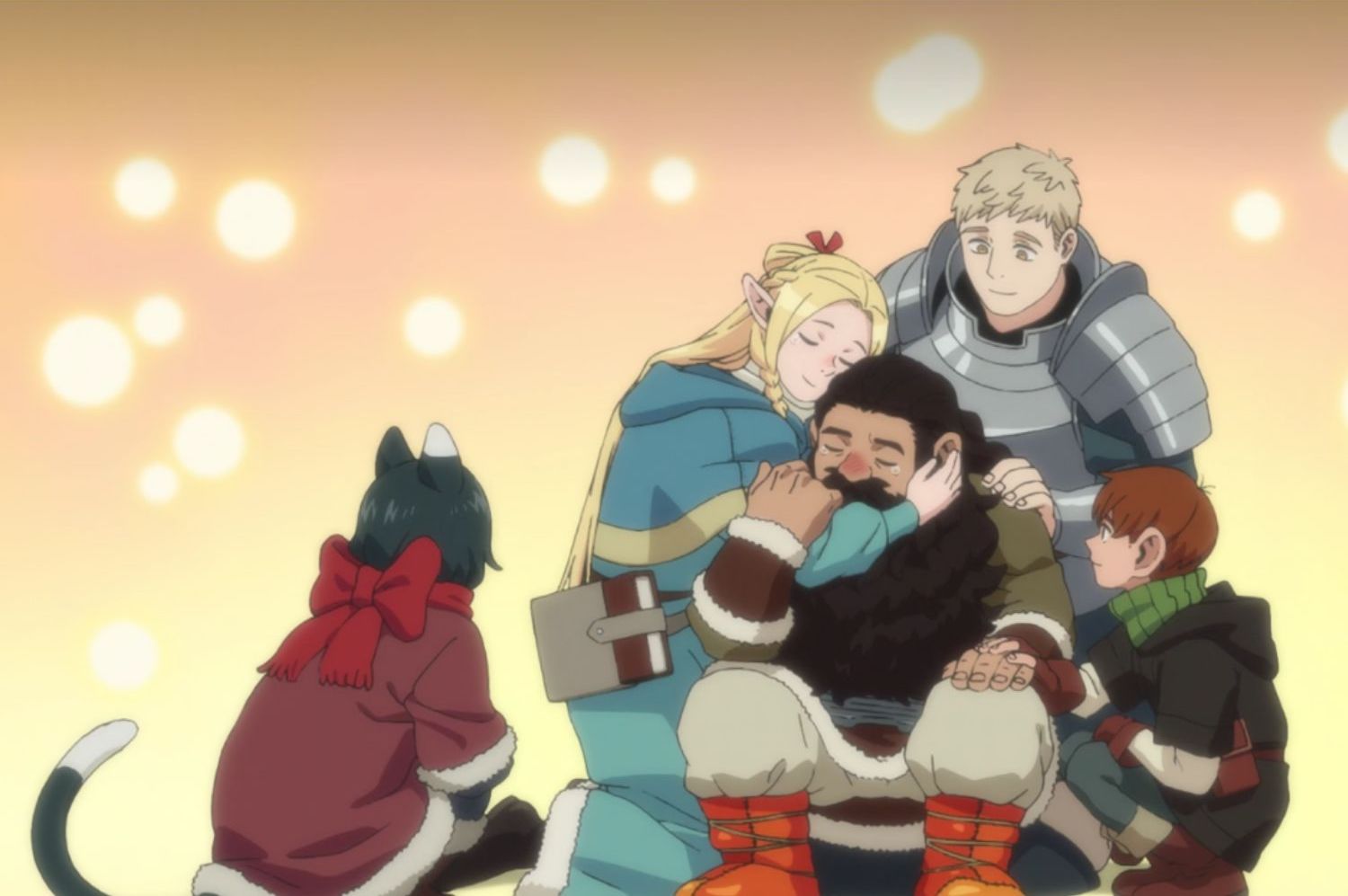Note: This article pertains to the first 24 episodes of Delicious in Dungeon. Because it’s more of a character study, feel free to read on without worrying about spoilers!
I’m starting this one off with a sad, possibly relatable story. Last weekend, a person I thought I was close to ended our friendship over a lengthy text rant. While I will be the first to admit our relationship needed work, the vitriol and finality of the message blindsided me. Every personality flaw, every insecurity, every mistake committed in this person’s presence was thrown back in my face in list format. Whiplash is an understatement; three weeks prior, they were at my apartment, eating scones I made to celebrate their birthday. I had no idea they were tallying all of my failings; I did not see the explosion coming.
In our society, people talk all too often about the best ways to cope with the demise of a romantic relationship. But many kinds of love are not romantic, and psychologically, the death of a friendship can be just as psychologically damaging. Maintaining friendships in adulthood proves a challenge for many of us, especially for those who may not live according to conventional societal expectations.
As an ace/aro/aego author and proud eternally single cat lady, my writing has long championed friendships rather than romance. Friendships are all I’ve got and all I have ever wanted. But this, combined with my specific soup of mental illnesses and disorders, culminates in having unrealistic expectations of those few people I befriend while also, simultaneously, failing to meet theirs. I am not always sane, but I am always vulnerable.
When I received the ruthless rant last Saturday night, panic kicked in. I started sobbing in the Don Quijote checkout and called my father, who is a therapist, for support. The next day was spent malingering in bed, feeling like a sorry excuse for a human being. It felt almost like I had food poisoning.
And hell if that isn’t an apt segue into the actual topic of this week’s article: Delicious in Dungeon, or Dungeon Meshi (“Dungeon Meals” in Japanese, shorthanded as Dunmeshi hereafter because man I do not care for the English title) a fantastic anime about weird food and weird friends. Dunmeshi addresses, with admirable panache, the idea that great relationships, just like good cooking, require balance, experience, patience, and a great deal of accommodation. It also presents a concept that I think we all need reaffirmed in life: every semi-decent person in the world, no matter their failings, is deserving of friendship.
Everything is an Ecosystem
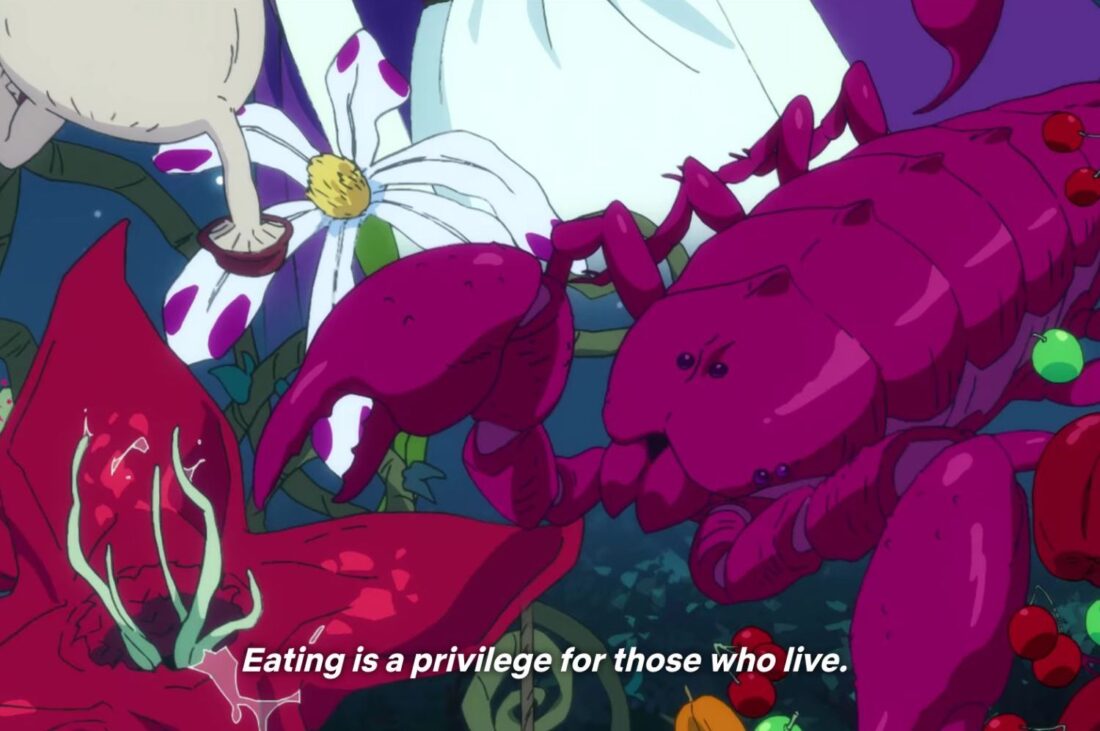
Mangaka Ryoko Kui is a total, unabashed geek. I say this with nothing but affection and admiration for her. A story like this could only be written by someone who rewatched LotR endlessly as a child and later took part in dozens of DnD campaigns. Fandom rumor has it that Kui deliberately timed the finale of her award-winning manga to the Baldur’s Gate 3 release date so that she could drop the pen and play the game instead.
Dunmeshi’s premise is as follows: a group of adventurers descends into the eponymous dungeon to rescue a fallen party member after she is swallowed by a dragon. The party consists of Laios, the human leader; Marcille the elf magician; Chilchuck the halfling locksmith; and, soon enough, Senshi the dwarf… chef. To rescue Laois’ sister, Falin, the gang must kill the Red Dragon before its slow, reptilian digestion dissolves her in its belly. But because they’re dirt-broke and short on time, they forgo buying supplies instead and instead take a more disgusting, unconventional route of catching, cooking, and eating the monsters they meet during their hasty descent.
Dunmeshi does assume its audience will know a thing or ten about fantasy tropes, magical creatures, and even tabletop character classes. But despite the seemingly traditional setting, it never lacks creativity. By choosing such a conventional story structure, Kui can draw the audience’s attention to unexpected, often neglected aspects of classic fantasy worldbuilding. Primarily, she focuses on the nuances of her atypical characters and, delightfully, the culinary arts.
As Laios says, “Every characteristic of an animal serves a purpose, or else it wouldn’t be there.” Kui gleefully applies this concept to chimeras, griffins, kelpies, and slimes, substantiating these monsters on a level rarely seen…and then goes another step further and imagines how best to cook them. Along with every recipe, we learn intricate details about the physiology of the monsters in the dungeon. By breaking monsters down to their myriad parts, relishing in their unique characteristics, she grants each and every one of them a wonderful sort of umami.
The magic here lies not in originality, but in extrapolation. Plenty of creators have written about fighting krakens; far fewer have written about the best way to season and cook one. Yet characters need to eat if they are to be believable. We’ve probably all read a subpar genre book only to realize halfway through that the characters have never once stopped to eat or sleep. More than any fantastical elements, neglecting a body’s basic needs in a story is the best way to shatter any suspension of disbelief.
Candied treasure bugs, sorbet chilled by ghosts, mandrake fruit tarts, barometz kebabs… Kui’s brilliant, joyful inventions, ranging from living armor being controlled by hidden colonies of edible mollusks to using the soil bodies of golems to cultivate herbs and veggies, make Dunmeshi not just more fun, but more real.
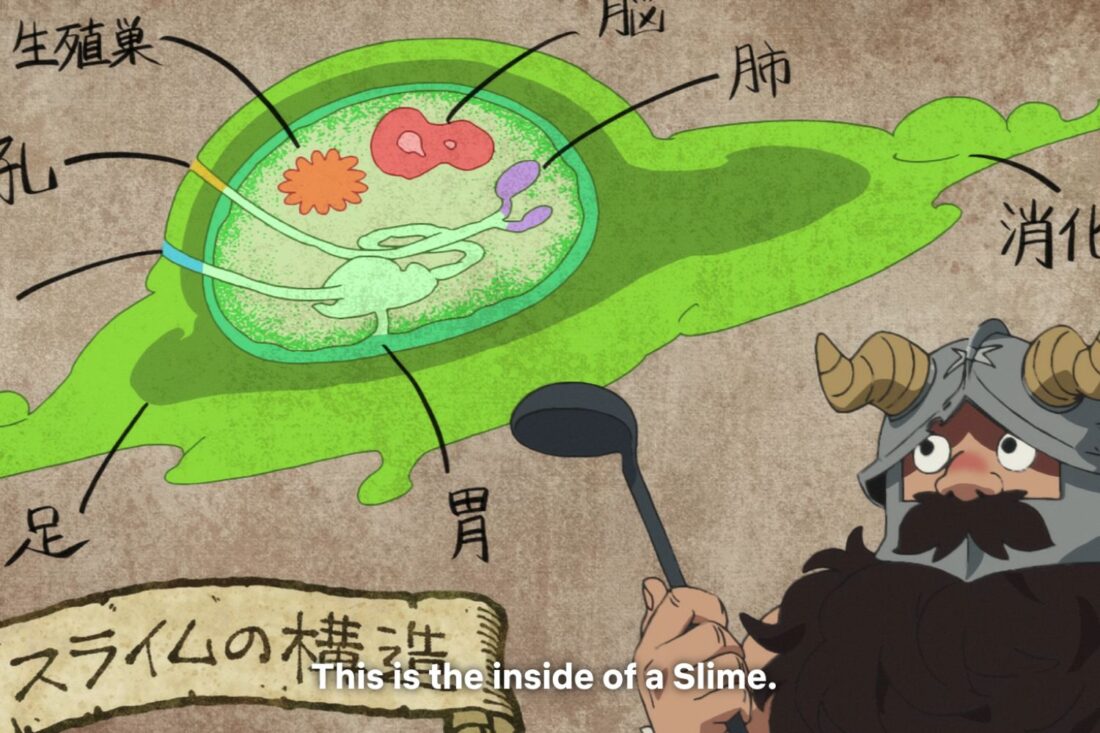
Even the dungeon itself is treated as a living entity. The so-called “lunatic magician” who created it poured himself into it, so that it changes shape according to his whims. The dungeon is described as being his arms and legs; when it is uncomfortable, it shifts its tunnels and pathways into new positions like a restless child. Small insect-like creatures act like blood cells, rushing to the wounds that axes and explosions leave in the dungeon walls, cleaning the blood from the floors, and healing the stone. Whenever one of the magician’s favorite monsters is destroyed, he feels it immediately, like an arrow to the knee, and he moves quickly to swat away his attackers.
In the Dunmeshi universe, the lines between monsters, men, and the environment becomes deliberately blurred. Kui extends the same curiosity to her singular cast of complex characters as she does to the anatomy of a dragon. Every person is a mysterious dungeon, full of crannies and unexpected depths, treasures and chasms.
Atypical Recipes, Atypical Folk
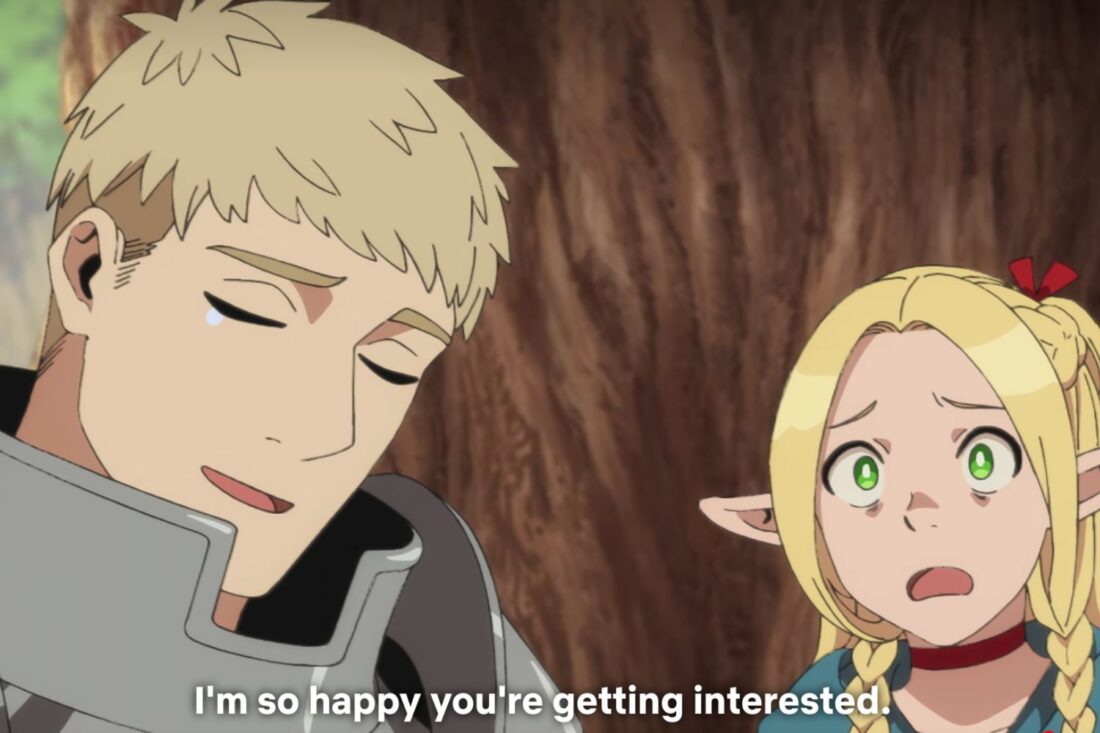
Within the fandom, many argue that Laois is on the autism spectrum; I don’t necessarily disagree, but I do feel that categorizing him is a little problematic. Very recently, author Ryoko Kui was vague when questioned about this topic, stating that fans can relate to Laios as they see fit. Here in Japan, autism is still widely misunderstood and stigmatized, due in part to Japanese culture’s adherence to collectivism. Given this, it may feel fraught for Japanese creators to label characters so explicitly. It is not surprising to see Kui avoid making concrete statements about her work, because anything concrete, while validating for many fans, may be alienating for just as many others. To be safe, for this article, I’ll describe Laios as having neurodivergent traits and leave it at that.
Meet Laios. Laios is the guy you meet at cons who can only talk about Gundam, your grandpa who only talks about model trains, or that one kid on the internet who really, really likes Komodo dragons. Laios can only talk about monsters. This guy hyper-fixates to the exclusion of rational thought. Yes, he wants to rescue his sister, but he wants to meet and eat as many monsters as possible, too. And, though it may seem insensitive to those not living in his monster-fueled brain, Laios does not see why one of those two desires should maybe outweigh the other.
While Laios’ quirks are sometimes played for laughs, his companions have long since accepted that he will sometimes say and do unpalatable things. They appreciate that Laios’ lack of social awareness is accompanied by a knack for objective observation which often saves them all. Laios is usually the first to decipher the best way to conquer an enemy, and he is always the first to try something new, whether it be a parasitic worm dinner or an offbeat fighting strategy.
Laios’ disinterest in all topics that aren’t monsters makes him incapable of being judgmental, too. It does not occur to him to think less of people, regardless of who or what they are, what they’ve done or been through. For his companions, this complete acceptance is a precious, novel experience. Laois is a decent friend by default.
When Laios questions a social norm, it goes one of two ways: either of his friends reprimand him but love him all the same, or his questions force them into surprised introspection and push them to reconsider their perception of the world.
Laois resonates most with people who live for their passions. He feels nothing but respect for Senshi’s devotion to cooking monsters, because fundamentally, Laios wants nothing more than to find people who can share in his enthusiasm. Senshi, for his part, has always been an outcast, a solitary dwarf with no interest in mining or smithing. Laois’ adoration is probably as welcome as it is surprising, a gift he never expected to receive.
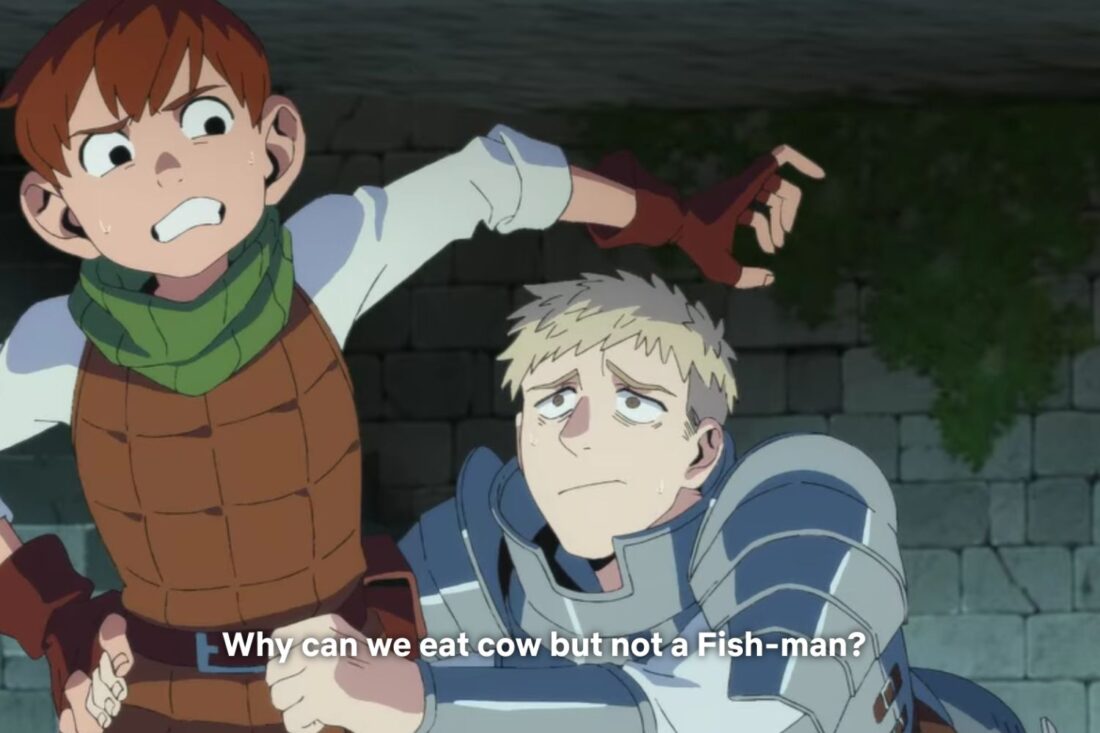
Chilchuck, the half-foot (basically a hobbit), tells Laois off for asking whether they can eat a merman, crying, “No eating demi-humans!” After all, Chilchuck is a demi-human, too, and often described as the most mature of the odd-duck party. Laois protests, saying pigs and cows are more closely related to humans than a fish-man, and even Chilchuck, practical to a fault, can only argue that it feels wrong. Chilchuck so often represses his emotions that Laois making him feel things is an impressive feat.
Marcille, a powerful elf magician, has enough skill and sense to keep her companions focused whenever their enthusiasm eclipses good sense. But Marcille is also painfully anxious, a former honor student who cannot cope with failing. She is reluctant to try anything that feels uncertain or dangerous. But faced with Laios’ blunt insistence, the path of least resistance means going along with his culinary whims. She is very attached to his sister and she can’t disagree that she’ll be no good to Falin on an empty stomach. Laios pushes Marcille out of her comfort zone time and again as she gradually warms to eating monster parts. With every downed scorpion and mandrake, her self-confidence grows.
The Gift of Absent Fanservice
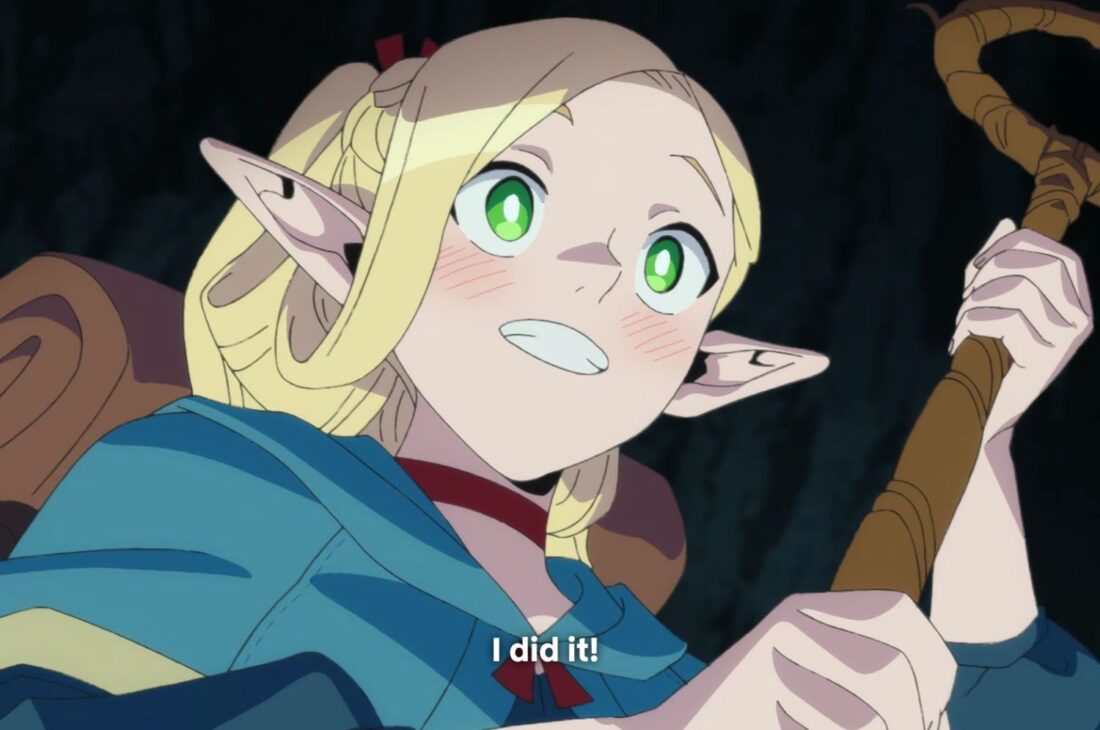
There is one memorable example of fanservice in DM. When Senshi, the middle-aged dwarf, accidentally ignites an explosion near the corpse of a slain monster, we are treated to a brief, comical glimpse of his tighty whities.
And that’s basically, beautifully, all.
I knew by the second episode that this series was written by a woman. I don’t say this to be sexist, but it’s true. And though I will not make assumptions about Kui’s identity, the series itself feels queer-coded to countless fans. Never are any of the characters sexualized in any way, and the Bechdel test is passed with flying colors throughout. Gender is so rarely brought up that fans have adopted not one but several characters as canonically nonbinary and/or gender-neutral.
This is not to say that positive depictions of masculinity and femininity are absent. Laois isn’t always physically strong, but he is brave. Senshi is a strong axe-wielding warrior, but also an excellent gardener and cook. Chilchuck… well, no spoilers regarding Chil, but he’s amazingly nuanced. Kui makes a deliberate point of teasing the former party member Shuro, the only character who tries to push more old-fashioned gender roles. Although he was “in love with” Falin, she had no idea, because he never once communicated that to her before suddenly proposing out of the blue.
Falin is worthy of her own article—self-assured and confidently weird, a girl with a knack for communicating with ghosts. Marcille is powerful but also takes good care of hair, in part because it strengthens her magic but also because she likes to. Later in the series, when a lovable cat-girl scamp joins the party, they all bask in a makeshift dungeon sauna and she goes topless and no one bats an eye.
As a tired old otaku, I can’t express how damned refreshing all of this is. Even the best anime often make mistakes when it comes to fanservice. Even modern series fall prey to cringeworthy beach episodes or onsen shenanigans involving the boys peeking over the walls to the girls’ baths. Dunmeshi doesn’t see the point. Why can’t every show be this tasteful?
The Art of Restraint
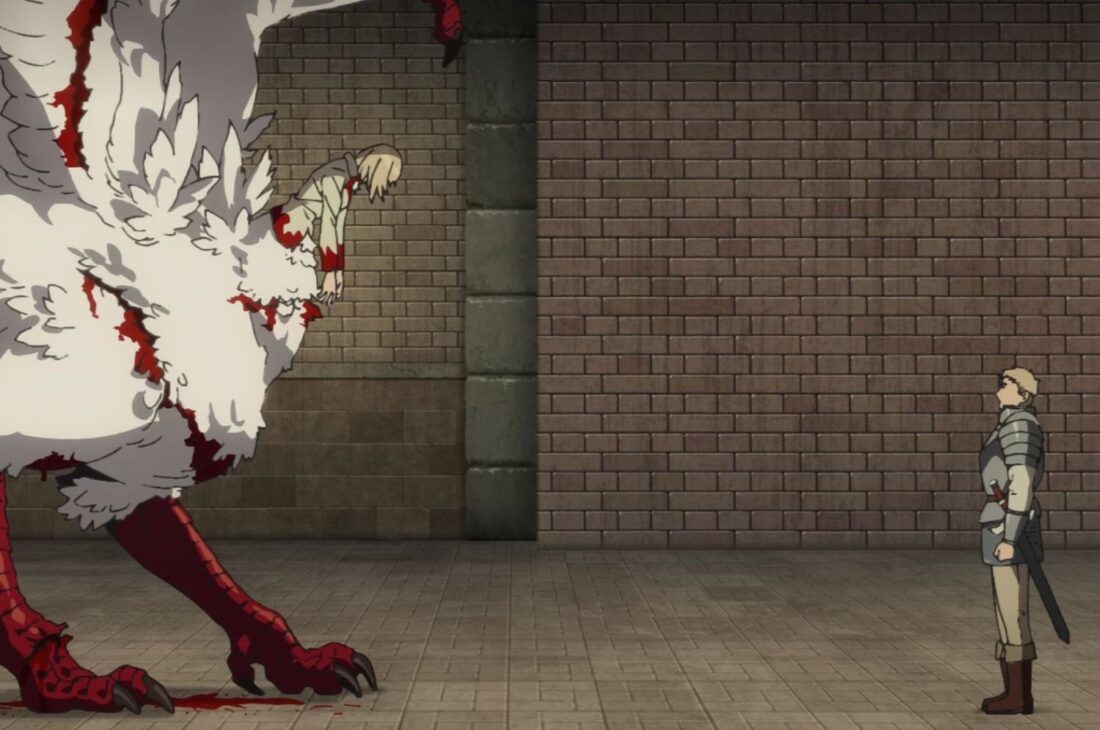
With regards to taste level, major kudos have to go to Studio Trigger. Otaku are familiar with Trigger’s origins as an ambitious offshoot of GAINAX, helmed by Hiroyuki Imaishi of Gurren Lagann fame. Trigger has been a fan-favorite studio for over a decade now. However, its bombastic animation and bold designs have sometimes fallen prey to valid cries of “style over substance” from critics.
Given this, Trigger deserves praise for the restraint demonstrated in constructing Dungeon Meshi. The show looks consistently great but rarely flashy; never do the visuals eclipse the story. Instead, the animators flex their art muscles in specific, memorable scenes and action sequences. There has never been any question that Studio Trigger boasts a huge stable of talent, but striking a careful balance is also vital when producing and animating a series.
A Balanced Meal
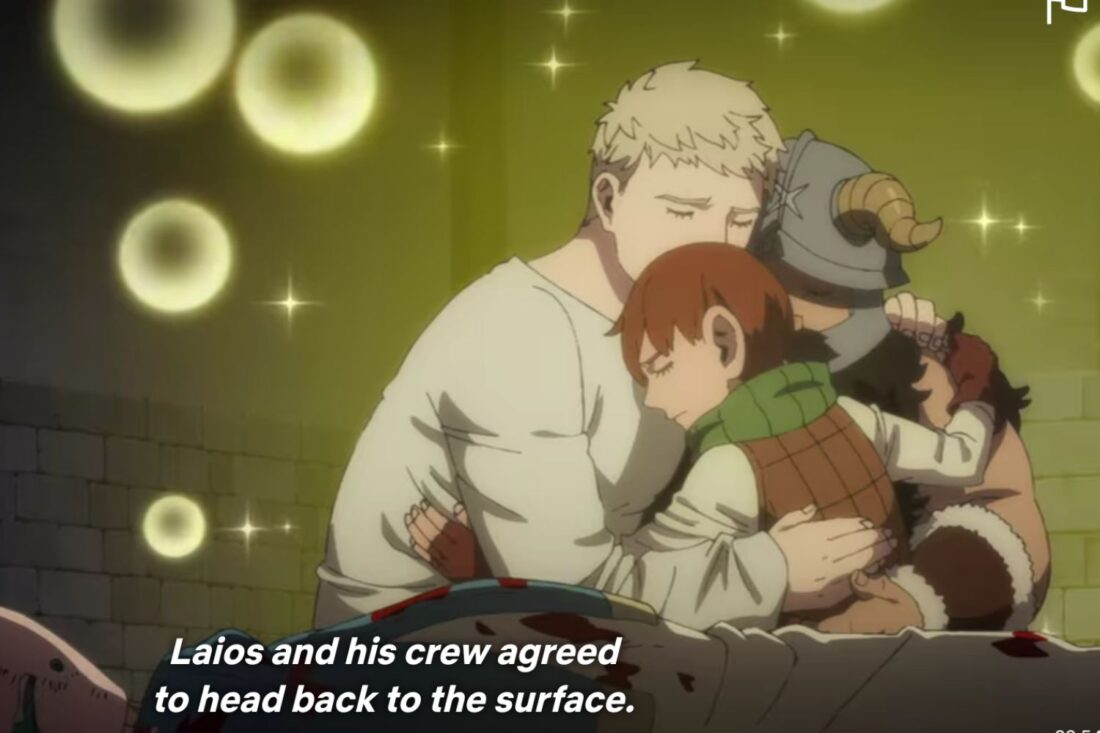
One of the strongest messages in Dunmeshi is that of diverse parts coming together to form a stronger, more capable whole. Bread is not bread without flour, water, and yeast, and this party is not functional without each member’s strengths. On its own, yeast is inedible, but most breads are also inedible without it.
Marcille initially believes that her worth depends on her usefulness. She is always disappointed in herself, and is stubborn about doing things “the right way.” But stubbornness goes hand-in-hand with tenacity, and given Marcille’s intelligence and magical talents, that stubborn streak leads to novel solutions. When she loses confidence in herself, the others build her back up again.
Chilchuck finds it easier to belittle himself than admit how much he cares for his friends. He also has difficulty engaging with his feelings. Midway through the show, Chilchuck must convince his companions to temporarily give up their quest to save Falin. He argues for going back to the surface to regroup, even though it makes him appear spineless. “That’s right, I’m a coward!” he declares. Another character sees right through his facade. “Just admit you don’t want to watch them die,” she says. He does, and they get it, and they agree.
Senshi, like so many independent people, has learned amazing self-sufficiency but has also become trapped in his own habits. In particular, he abhors bathing and distrusts magic. But he values hard work and providing things for other people. When Marcille makes him soap in order to cast a spell on him, he is grateful for her efforts and accepts the bath and magic instantly. It is because they appreciate each other that they can gradually change each other for the better.
As for Laios? Among the most affecting moments in the show are those in which Laios realizes he has acted incorrectly in a social situation without really understanding why. In one scene he smiles and declares, “We probably wouldn’t have gotten to eat so much great food if Falin was here!” His companions’ reactions are enough to confirm he has gone too far.
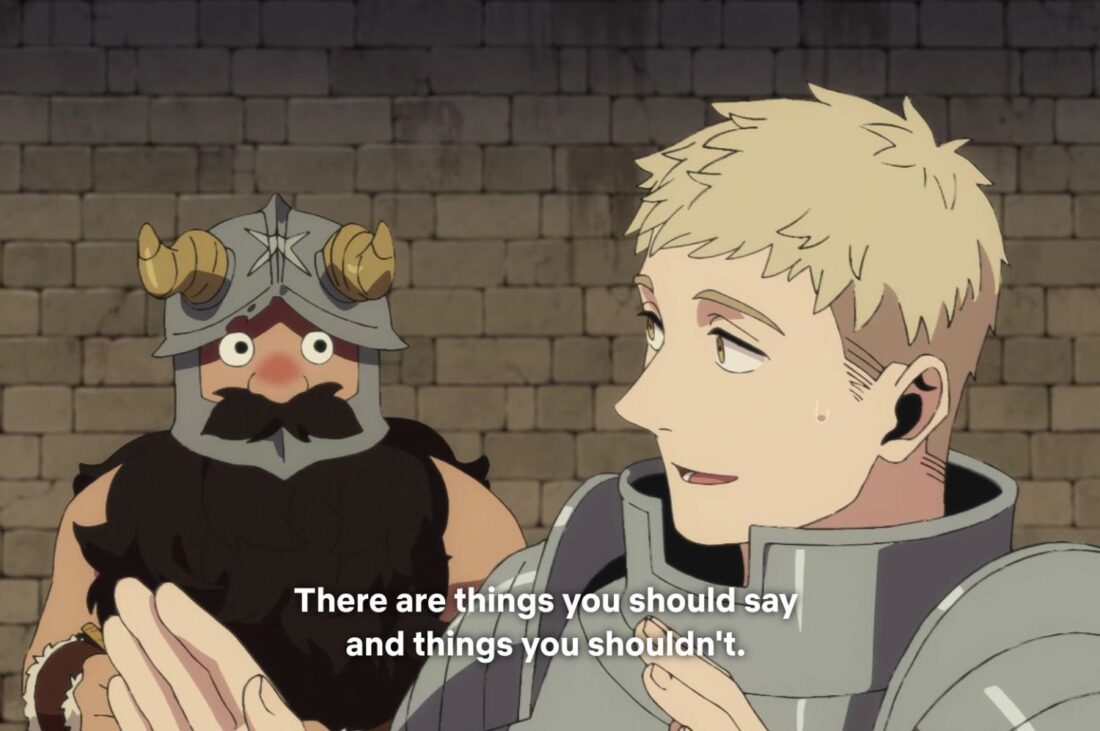
Laios is crushed, but not for long. Because if he sometimes lacks empathy, his friends are his compass to finding it.
Cooking allegories are obviously unavoidable, so let’s indulge. Ingredients in friendships, just as in recipes, need to balance out. If Senshi is the meaty core of the group that gives it shape, Laios is the salt that gives it character, and Chilchuck is the acid that adds enough bitterness to keep them grounded, then Marcille is the fire that keeps them all moving. For each of these characters, belonging has never been easy. But just as their bodies find sustenance in shared meals, their souls find sustenance in their shared experiences.
Death is Essential to Life
All ecosystems are cyclical, and things must die for other things to live. And so, I will forever be grateful that I finally engaged in this modern masterpiece not when everyone told me to, not years ago when I worked in a bookstore and stocked the manga on shelves, and not even when I was supposed to watch it last month. Dunmeshi seems to find the fans who need it right when they need it most.
In the very first episode, the initial party grows smaller by three; Falin is eaten by the dragon, and two other companions leave in the wake of her demise. The remaining adventurers are shaken, unsteady on their feet and uncertain how to proceed. But then they meet Senshi, and learn about dungeon cooking, and forge ahead with new vigor. It is only after they have been devastated that they feel ready to try something completely new.
There will always be times in life when we part with those we care for, for one reason or another. Sometimes the partings are amicable, and sometimes they are awful, and sometimes they are slow and sad. But every relationship, even the unhealthy ones, contribute to the people we become. If some ingredients aren’t compatible, it could be because people can be monstrous to each other in a thousand miniscule and massive ways, or it could be because not everyone has the same tastes anyhow. What seems right to one person can seem immensely wrong to another.
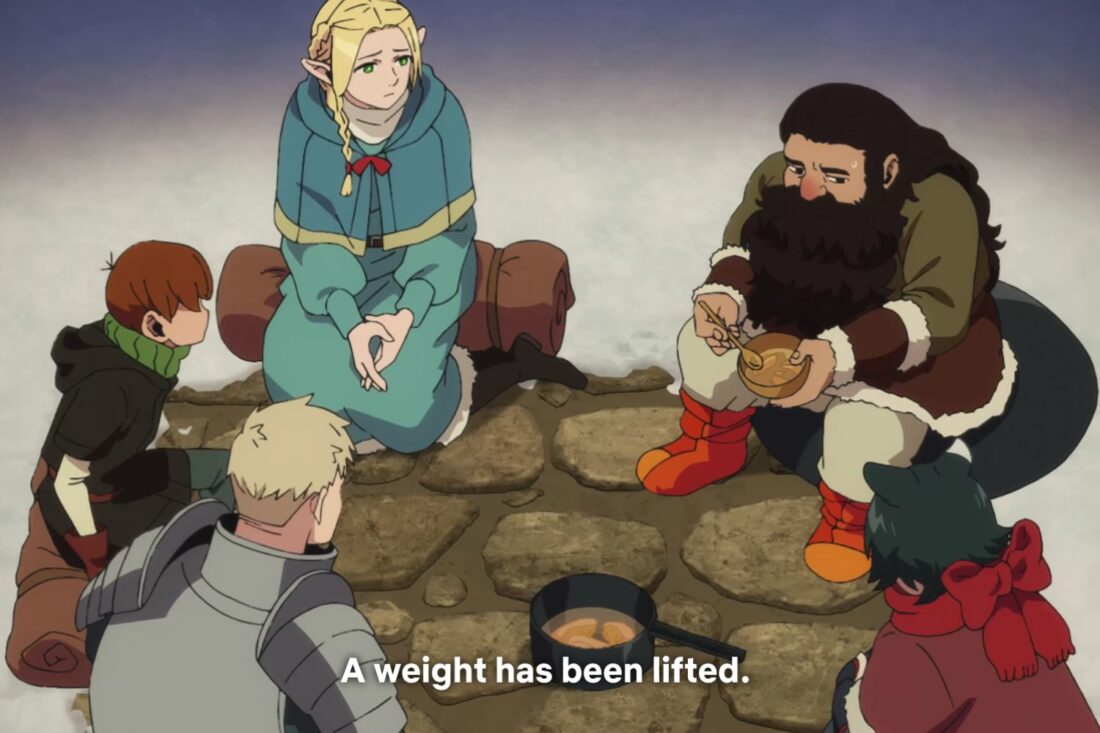
One of my best friends uses a platitude fit for any grandmother: “Friendships have their seasons.” If this fails to resonate, well, let’s be grateful that shows like Dungeon Meshi exist, presenting us with a thousand delicious, detailed new ways to express sentimental ideas. And so, should you find yourself suffering from a friendship gone awry, I offer you these magical, nonsensical words of wisdom:
“Dungeon Meshi! Ah, Dungeon Meshi.”
In this article:
Up Next:
